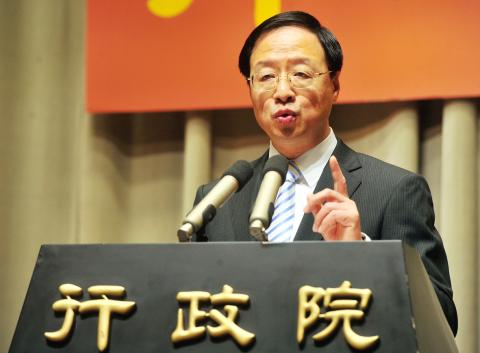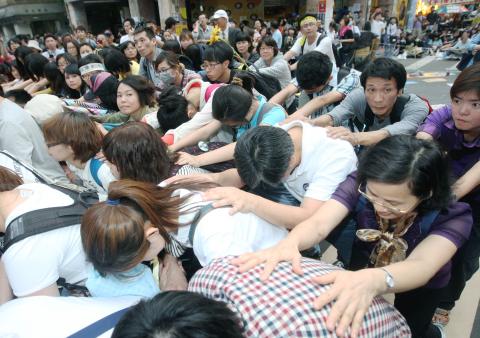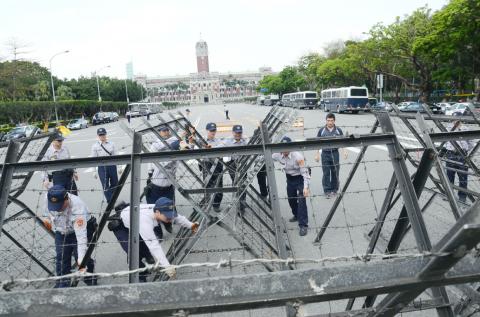Premier Jiang Yi-huah (江宜樺) yesterday defended the bloody crackdown on student protesters occupying the Executive Yuan from Sunday evening through early Monday morning as a necessary measure, while rejecting the protesters’ call to withdraw the cross-strait service trade pact or suspend its review until legislation to monitor cross-strait agreements is set up.
While expressing regret over the injuries suffered by both protesters and police, Jiang defended the police action as “necessary.”
“As the protesters were trying to take over the Executive Yuan, we had to ask the police to take harsh measures to disperse them. Officers and protesters were injured and, according to data provided by the National Police Agency, a total of 174 officers and protesters were injured, with more officers than protesters being hurt,” Jiang told a press conference at the Executive Yuan yesterday morning.

Photo: Chien Jung-fong, Taipei Times
“I would like to express my deep regret about the protest that got out of control, and the ensuing forced eviction, which was necessary,” he said.
The premier said he was open to the idea of setting up legislation that would monitor cross-strait agreements, but he would not withdraw the service trade agreement from the legislature or suspend its legislative review.
Responding to Jiang’s comments, a representative of the student protests, Shih I-lun (施懿倫), said the premier’s remarks were “meaningless” and “insincere.”

Photo: CNA
“Jiang has been making similar meaningless comments for a week, since he came to the Legislative Yuan on Saturday [to talk to the protesters]. It doesn’t make any sense to me when he says that he supports legislation to monitor cross-strait agreements, but also says that the service trade pact should not be monitored by the law,” Shih said.
As for Jiang’s defense of the violent crackdown, Shih said that President Ma Ying-jeou (馬英九) and Jiang should take full responsibility for the incident.
“The occupation was largely peaceful, with demonstrators staging a sit-in, chanting slogans. Violence only broke out when police, following Jiang’s order, starting the heavy crackdown on peaceful demonstrators,” Shih said.

Photo: Sung Hsiao-hai, Taipei Times
Jiang held the press conference after the student-led occupation movement earlier called on the public to attend an open-ended rally in front of the Presidential Office tomorrow afternoon.
According to Taipei City Zhongzheng First Precinct Police Chief Fang Yang-ning (方仰寧), the event organizers have applied for a permit for a rally of 100,000 people and the application has been approved. However, participants are required to disperse by midnight, he added.
Meanwhile, although a number of images, video clips and witness accounts have surfaced about police officers beating up protesters and reporters with batons and shields, Deputy Minister of the Interior Chen Chun-ching (陳純敬) and National Police Agency Deputy Director-General Tsai Chun-chang (蔡俊章) insisted yesterday that the police “gently” removed protesters occupying the Executive Yuan.
“It is true that 55 protesters were wounded, but the injuries were caused by the pulling and shoving that occurred when they resisted officers’ attempts to remove them,” Tsai said.
Asked about reports of police forcing reporters to leave and beating them, Chen said they asked members of the media to leave to protect them.
“If there is evidence that the police attacked reporters, we will launch an investigation,” he said.
Additional reporting by CNA

Intelligence agents have recorded 510,000 instances of “controversial information” being spread online by the Chinese Communist Party (CCP) so far this year, the National Security Bureau (NSB) said in a report yesterday, as it warned of artificial intelligence (AI) being employed to generate destabilizing misinformation. The bureau submitted a written report to the Legislative Yuan in preparation for National Security Bureau Director-General Tsai Ming-yen’s (蔡明彥) appearance before the Foreign Affairs and National Defense Committee today. The CCP has been using cognitive warfare to divide Taiwanese society by commenting on controversial issues such as Taiwan Semiconductor Manufacturing Co’s (TSMC, 台積電) investments in the

INVESTIGATION: The case is the latest instance of a DPP figure being implicated in an espionage network accused of allegedly leaking information to Chinese intelligence Democratic Progressive Party (DPP) member Ho Jen-chieh (何仁傑) was detained and held incommunicado yesterday on suspicion of spying for China during his tenure as assistant to then-minister of foreign affairs Joseph Wu (吳釗燮). The Taipei District Prosecutors’ Office said Ho was implicated during its investigation into alleged spying activities by former Presidential Office consultant Wu Shang-yu (吳尚雨). Prosecutors said there is reason to believe Ho breached the National Security Act (國家安全法) by leaking classified Ministry of Foreign Affairs information to Chinese intelligence. Following interrogation, prosecutors petitioned the Taipei District Court to detain Ho, citing concerns over potential collusion or tampering of evidence. The

‘COMPREHENSIVE PLAN’: Lin Chia-lung said that the government was ready to talk about a variety of issues, including investment in and purchases from the US The National Stabilization Fund (NSF) yesterday announced that it would step in to staunch stock market losses for the ninth time in the nation’s history. An NSF board meeting, originally scheduled for Monday next week, was moved to yesterday after stocks plummeted in the wake of US President Donald Trump’s announcement of 32 percent tariffs on Taiwan on Wednesday last week. Board members voted to support the stock market with the NT$500 billion (US$15.15 billion) fund, with injections of funds to begin as soon as today. The NSF in 2000 injected NT$120 billion to stabilize stocks, the most ever. The lowest amount it

NEGOTIATIONS: Taiwan has good relations with Washington and the outlook for the negotiations looks promising, Minister of Economic Affairs J.W. Kuo said Taiwan’s GDP growth this year is expected to decrease by 0.43 to 1.61 percentage points due to the effects of US tariffs, National Development Council (NDC) Minister Paul Liu (劉鏡清) said at a meeting of the legislature’s Economics Committee in Taipei yesterday, citing a preliminary estimate by a private research institution. Taiwan’s economy would be significantly affected by the 32 percent “reciprocal” tariffs slapped by the US, which took effect yesterday, Liu said, adding that GDP growth could fall below 3 percent and potentially even dip below 2 percent to 1.53 percent this year. The council has commissioned another institution